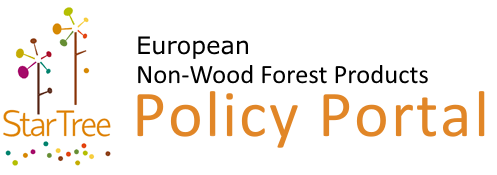Plans for mycological use.
Description
Brief description of the instrument and its modus operandi
Micodata is a system designed to collect and manage data concerning the production and use of edible wild mushrooms of social and economic interest in Castilla y León, wich utilizes a spatial database (MicodataGIS) regularly updated with referenced edaphoclimatic information supplied by the National Metereological Institute. A service providing mycological information for harvesters and offering technical advice for the planning and management of resources in the region is available from www.micodata.es
Which problem the instrument is supposed to solve?
Micodata address the lack of a service providing mycological information for harvesters and offering technical advice for the planning and management of resources
Purpose or main objective / overall goal of the instrument?
Micodata allows the optimal planning and management of resources, so that the risk of negative impact decreases.
Side objectives/goals of the instrument?
This instrument educates the collector to take care this wild resource, protecting the biodiversity.
Innovation content or potential of the instrument?
Micodata combines: a) A model of the mycological production compatible with conservation of mycological resources. B) generate profitable alternatives for cultivation of edible wild mushrooms on a marginal land. C) cuantifies and improves the use of mycological resources in Castilla y León. D) integrates a planning of micolgical resources into forestry management.
Which laws and regulations support the implement of this instrument?
Decree 130/1999, of June 17, orders and regulates the mycological uses, in the forests located in the community of Castilla y León.
The initiator/promoter of the instrument?
It was promoted for the Valonsadero Research Center, today extinted.
Which organizations are involved in the operationalization of the instrument?
Junta de Castilla y León (Regional Entity)
How the monitoring is ensured?
We have defined in this questionnaire instruments in the field of mushrooms, resin and pinecones and pine nuts. All these actions are supervised by the body ranger dependent Castilla y León, as well as the civil service SEPRONA guard, and state security bodies. Mushrooms // For Management Units Mycological monitoring collection is ensured by issuing collection permits both commercial and recreational level. Harvest limits annually based on studies of exploitation and annual production are determined
How the compliance is ensured?
In the case of NWFPs described before, compliance is ensured through the harvest limits established in licenses both recreational use and commercial use. With no body exclusively NWFPs protection nowadays, these quantities are checked by enforcement state bodies SEPRONA through special campaigns due to the seasonality of the resources. // In Mushrooms case, according to data from the counseling of the Environment, for the year 2013 the sanctions range between 100 and 1,000 euros. Between 80 and 90% of them have less than 100 euros, most of them for not having permission. Production is requisitioned and generally usually delivered to homes or humanitarian centers.
How is the overall performance of the instrument?
For mushrooms , progress has been very positive. Castilla y León is a national community of reference for the development of a range of skills associated with the NWFP. We have developed a monitoring system covering the whole process from harvesting to final consumer. Progress is also expected in matters related to traceability. According micodata instrument, the production of edible wild mushrooms in the mountains of estimated Castilla y León in 2012 was 19,205 tons, which can be considered as a year of medium production level. This value of production should not be considered harvested production, which in an average year is estimated at 4,400 tonnes, ie 23% of the gross value generated by the mountains in 2012
References
Order FYM/744/2012; Order MAM/341/2008 ; R/R 30/2009 ; Order AYG/1815 ; Stakeholders consultation ; Junta de Castilla y León newsletter and mail consultation
Brief description of the context for the emergence of the instrument
Mushrooms: The production of edible wild mushrooms estimated the mountains of Castilla y León in 2012 was 19,205 tons, which can be considered as a year of average production level. This value of production should not be considered harvested production, which in an average year is estimated at 4,400 tonnes, ie 23% of the gross value generated by the mountains in 2012. (Micodata)
Have any of the items mentioned above changed since the instrument entered into force?
No
Is there any qualitative or quantitative study of the impacts of the instrument?
Yes, please specify
Details
Mushrooms: Micodata, has elaborated several studies related to regulation and mycological study of its resources to develope future policies.
Related to
• Plans for mycological use (Micodata) (2000)
| Instrument | |
| Year | 2000 |
|---|---|
| Affected actors | Landowner/land manager, Picker/harvester/hunter |
| Products | Mushrooms/truffles |
| Countries | Spain |
| Regions (NUTS 2) | Castile and León |
| Geographical scope | Regional |
